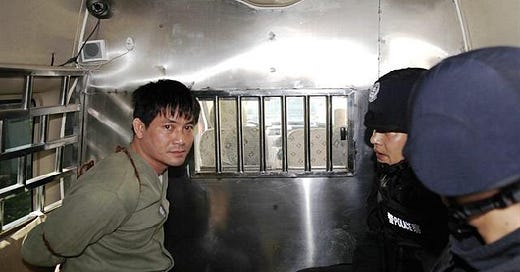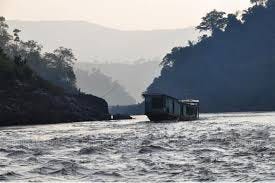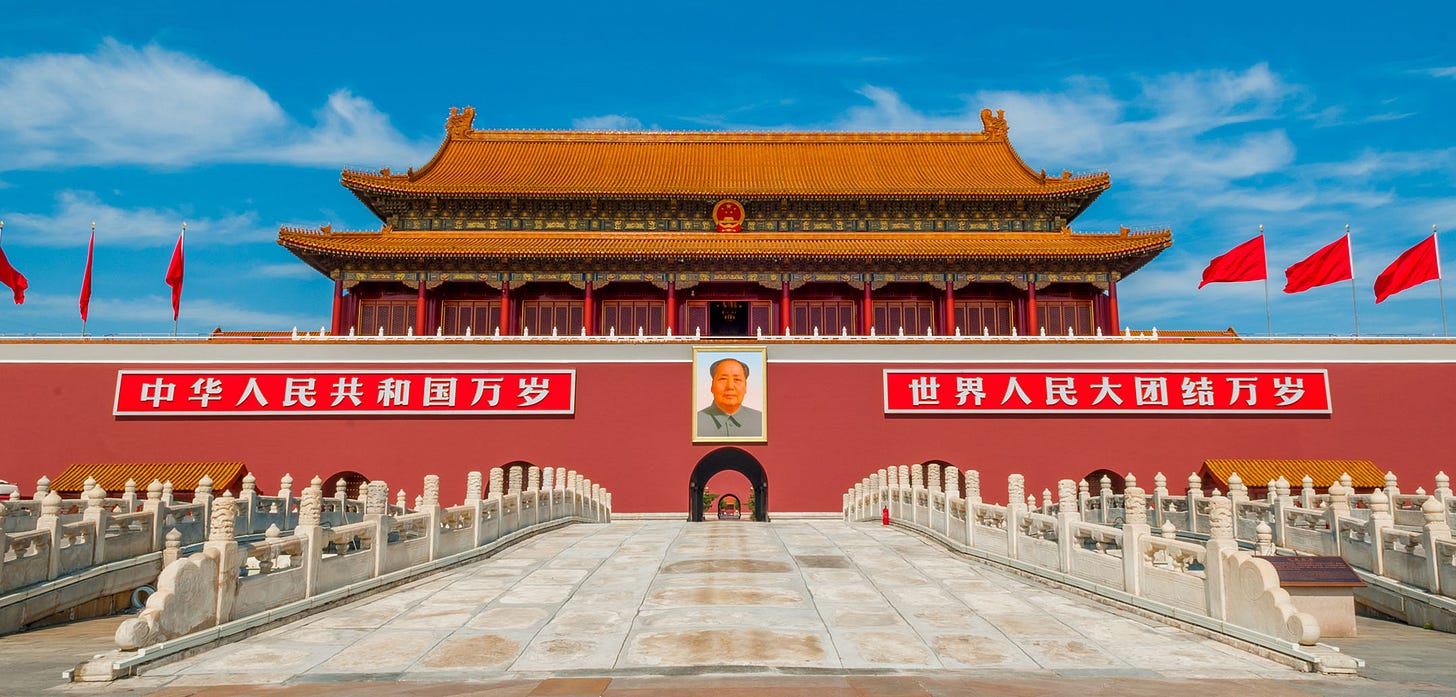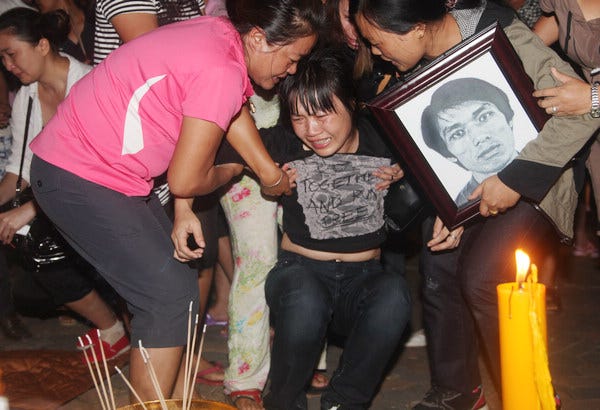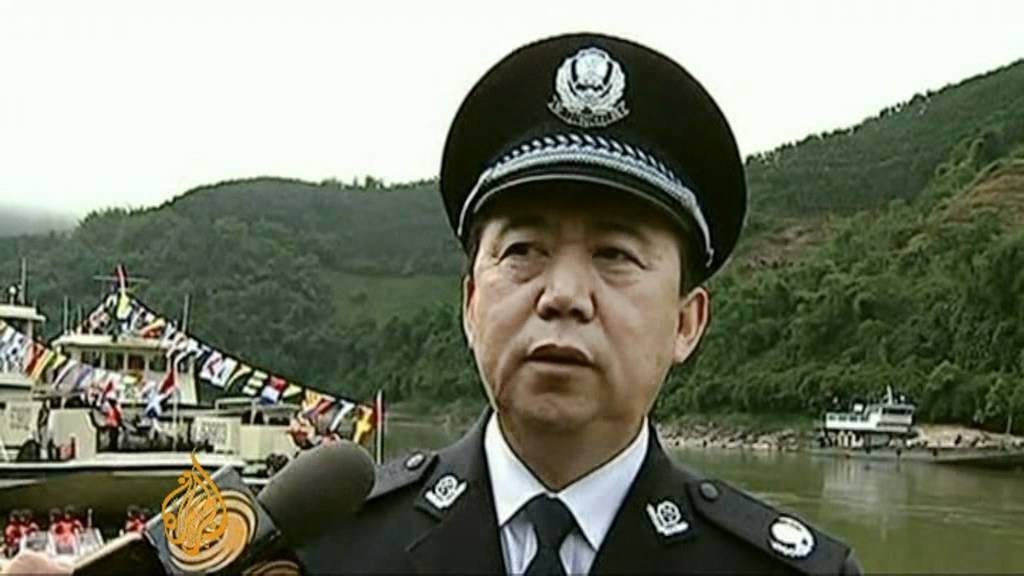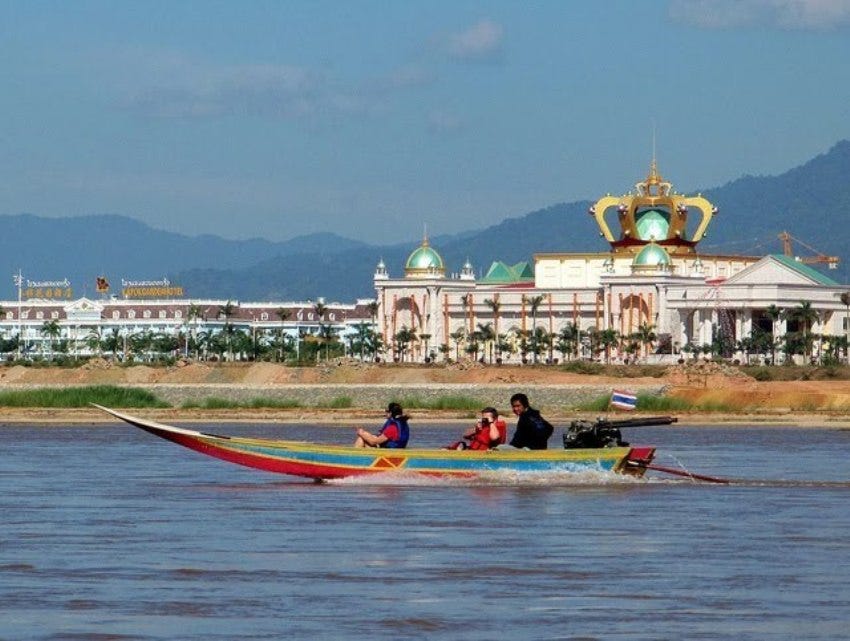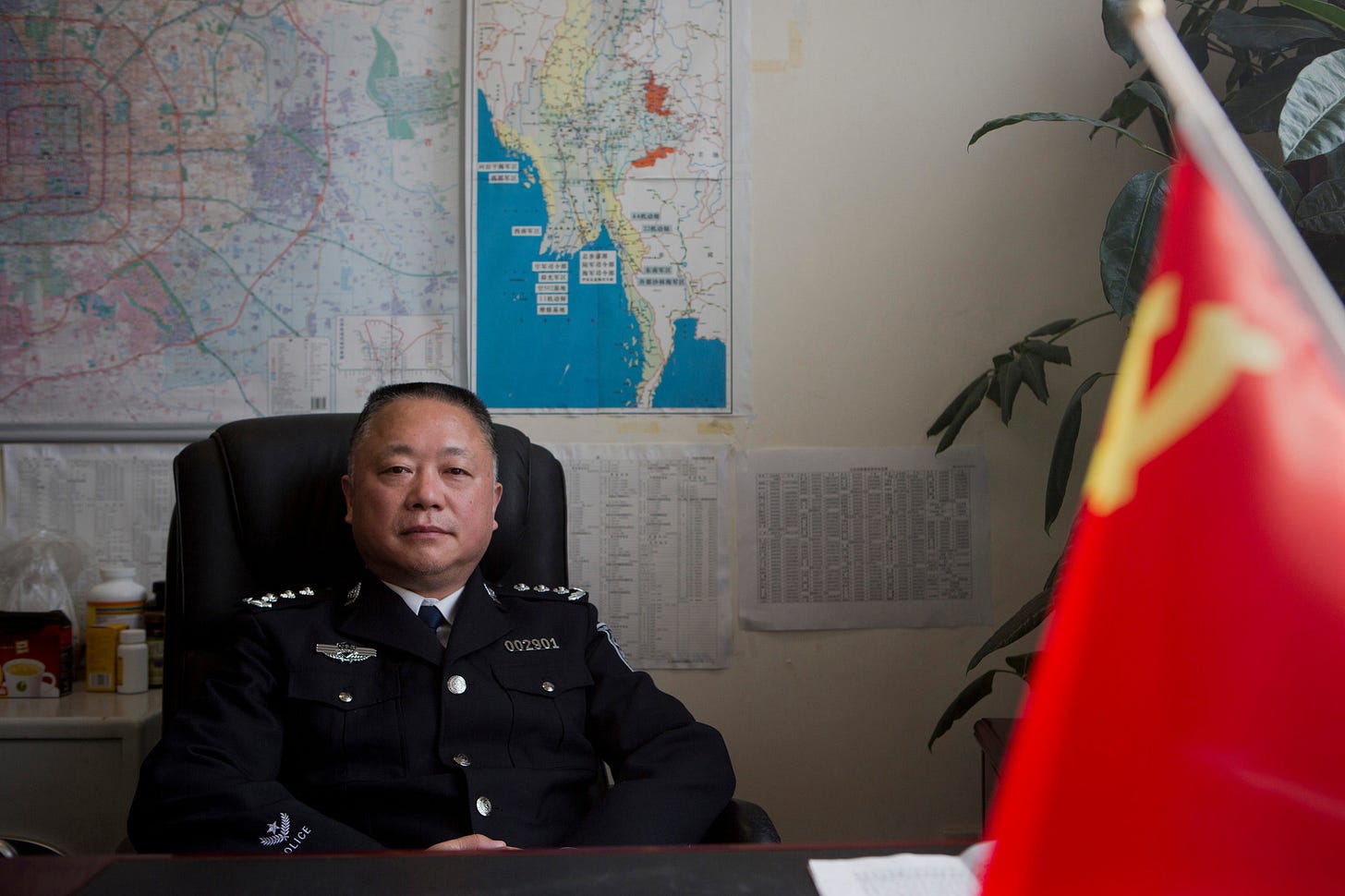Review of Operation Mekong: The Straight Dope
The movie hooked us harder than a fiend on a batch of Naw Kham’s yaba. But we're not buying whatever it's trying to sell us.
She was a dancer.
Her body leaps and twirls effortlessly on the stage.
She hides back stage after the show. Her porcelain face flush with rouge and body heat.
She jabs the needle into her arm. The cool junk moves into the dancer's blood. It knocks her back, her head bobs and her eyes roll. But she's not done.
She's a pro with the meth pipe and lighter, cracking the flint and slapping the flame on the glass bowl to unlock the sweet smoke that dance for her.
She moves onto lines. They're cut neat and true on the dancer's mirror. She's slipping away. The camera cuts and jerks around, the lens blurs with dreamy blues and purples.
It's the trippy opening scene of Operation Mekong, the 2016 Chinese produced film that looks at the events of October 5th, 2011, known as the Mekong River Massacre.
A narrator’s serious voice is laid on top of the images of the dancer’s drug binge. He talks frankly about the damaging effect of drug use on one's health and society.
The scene jumps to a cargo boat. It cuts through a mucky river. Up ahead the river narrows. The boat's captain becomes visibly nervous.
The narrator calls this "The Hell's Gate."
And this is where the story begins. In real life, the Golden Triangle is still under the spell of what transpires once the boat enters the Hell’s Gate.
When I set out to write the review for Operation Mekong, I kept an open mind. I knew that the truth would be hard to come across. Even those who have been involved with the subject in this region for decades don't know all the answers.
My research has raised more questions than I thought it would.
The review will give my take on the movie: its plot, the characters, its entertainment value. But it’s more concerned with the facts and the deeper background of the real events that informed the film.
I really wanted to know how the two met and diverged. The truth and the fictions, and the gray zone between.
Two barges enter Hell's Gate
Those two ships, the Yu Xing 8 and the Hua Ping, will sail into Hell's Gate but won't leave the same.
That much is clear to the audience of Operation Mekong. The captain explains to a crew member how Hell's Gate got its name.
Pirates plagued this strip of the Mekong for years. Many Chinese barges had been raided by the pirates. Some boat crews had been killed.
That's the cue. The speedboats and the pirates roll in right after that explanation. The film wastes no time getting into the action. The barges are stormed and brutal executions go down: there's no life spared.
This is what is known as the Mekong River Massacre.
In total, 13 Chinese crew were murdered.
The Hell's Gate lived up to its reputation. Like the captain said, this stretch of river was well-known for pirate raids on Chinese vessels.
In real life, the 5 years leading up to the Mekong River Massacre had seen 16 other murders of Chinese nationals on this deadly stretch. A total of 28 pirate attacks were carried out, mostly in raids to steal cargo and goods, which were handed out Robin Hood style to the poor villages that dot either side of the river in both Laos and Myanmar.
The man behind these raids is Naw Kham.
A ruthless, scrappy drug kingpin who trained under the notorious Khun Sa. He was born on November 8th, 1969, an ethnic Shan from Lashio, Myanmar. He spoke Shan, Burmese, and Thai. A true man of the Golden Triangle.
He took over Khun Sa's forces after the Dark Prince was banished to Yangon in 1996. Naw Kham networked with local ethnic groups, winning their favor and protection.
He built his empire with the backing of many divergent groups: Burmese and ethnic minority villagers, militias of every stripe in the region, along with the powerful Tatmadaw, Myanmar's armed forces..
The scope of his influence ran from Tachileik, just on the other side of the Thai-Burma border from Mae Sai, all the way up to Kengtung.
Some called him Robin Hood. After raids on Chinese ships, he'd shower cash and sought after goods on the villages.
But to most, Naw Kham was only known as The Godfather.
The fury in Beijing
It's hard to overstate the reaction of the murders that happened on the Yu Xing 8 and the Hua Ping.
On the face of it, the deed was dirty as the Mekong River where it went down: 13 innocents were dead.
But it was how it happened, how the bodies were discovered, how the information hit the internet, and the public's reaction that brought the full force of Beijing's boot down on the Golden Triangle - a boot print still left to this day.
Operation Mekong makes no apologies for avenging the execution of the 13 Chinese citizens on the wild waters of the Mekong, so far from the China’s civilized eastern coast.
Nor does it apologize for the puffed up chests of Chinese police and military elite. They are a strong arm and they will use force if and when necessary.
The film is quick to show this on screen.
After the barges are attacked on the Mekong, the film shows a sequence of sophisticated police training exercises in Beijing.
A posh, comfortable viewing area is set up for the elite members of the CCP to watch police in swat and tactical gear carry out stunts on the tarmac before them.
Lots of explosions and impossible physical feats end with the polite yet robust applause from the communist party officials watching above.
This is when a minister gets the news from the Mekong.
He immediately knows who to call.
The only guy for the job? The Chinese anti-narcotic chief who operates out of Yunnan, the Chinese province that juts up against the Golden Triangle.
In the film this guy is called Captain Gao. In real life this man is known as Liu Yuejin - a man that we'll cover more in this review.
In the film, he's shown as a middle age man, a hero, a family man, a savvy police leader that will do anything to get the job done even if it goes afoul of the law.
Oh, he also takes care of a German Shepherd named Bingo.
He’s sympathetic and the viewer is led to root for him throughout the whole film.
Beijing can’t trust Bangkok
The film cuts to a press conference in Thailand.
It’s a very brief scene. Screentime? About 15 seconds.
The Thai press, soldiers, and police are gathered to hear the official announcement from their investigation. A spokesman from the Phu Muang - a fierce special forces division within the Thai army - details a raid on the Chinese barges by Thai military.
A key detail is dropped here, but you have to pay attention: 900,000 yaba tabs are found aboard the ship.
In real life, this detail is critical to the whole story.
One day before the massacre of October 5th, Thai law enforcement was tipped off about a drug run that was going down between Burma and Thailand. The Phu Muang, their namesake being a 13th century Thai warrior-king, were sent in to intercept the drugs.
What they found? The two ill-fated Chinese barges, the Hua Ping and the Yu Xing 8. The Thai special forces were on the receiving end of hostile fire from the boats. The Phu Muang exchanged gunfire with the gunmen, who quickly abandoned the two Chinese vessels.
The Phu Muang stormed the barges. They found 900,000 yaba tabs split between the two ships. And they found one dead gunman in the blood-soaked cabin.
The problem? The rest of the Chinese crew were missing. Poof. Gone.
The Thai brass started asking questions.
Why would there be that much yaba on board cargo boats? They didn’t know.
Where were the boats going? The Kings Romans casino - yeah, the same one we’ve covered before. The same one owned by Zhao Wei, drug kingpin and casino mogul. We’ll get to him again later in this article.
Were the Chinese smuggling drugs? It’s a theory, one that the Thais were willing to entertain.
The film glosses over all of this, everything I just wrote about the Phu Muang and the destination for the cargo, in 15 seconds.
It’s a sign of how much nuance the film gives to the inconvenient facts that surround the Mekong River Massacre.
Let’s meet Liu Yuejin, or Captain Gao
In real life, Liu Yuejin is an old hand in the fight against narcotics both in China and the Golden Triangle. He’s the commander for China’s anti-narcotic enforcement agency based in Yunnan, a stone’s throw from that bloody stretch of the Mekong where the massacre went down.
Beijing tapped him to find Naw Kham.
In recent years, he was the guy on the charge to stamp out illegal fentanyl production in China.
His view on the matter? China barely produced any of the drug. And the problem was with Americans - they’re the addicts, after all.
Back to the film:
The minister in Beijing has only one guy he can trust in the region. He calls on the Yunnan drug chief, Captain Gao - the analog for Liu Yuejin - to find the truth.
It's established early on in the film that China alone can clean up the mess in the Golden Triangle.
The region’s other countries are incapable: Thailand for being untrustworthy; Myanmar for being lawless; and Laos for being weak and ineffective.
In real life, Thailand did do their own investigation. And it came to a couple different conclusions.
The first was that a Thai fugitive was behind the attack. The investigation team, headed by then deputy national police chief Pansiri Prapawat, put forth Olarn Sompongphan, alias Chamras, as the mastermind behind the Mekong massacre.
Mr. Olarn has his own storied past: he was heavily involved with narcotic smuggling. But even heavier still: he was wanted for the murder of Chaiyaphum province's deputy interior minister in Chiang Rai.
After the massacre, Mr. Olarn fled Thailand into the hills of the Golden Triangle and joined up with the United Wa army - an ethnic group militia notorious for narcotic production. I’ve searched everywhere I could, but there has never been any other reports on Mr. Olarn since he fled into Wa territory.
Over 109 witnesses were interviewed by Thai authorities and warrants for the arrest of 9 Thai soldiers were issued.
In real life, the Thais were looking within to solve the massacre whodunnit. The investigation didn't look to scapegoat Naw Kham, even though they very well could. To be frank, it'd fit with a common modus operandi in Thailand to blame problems on Burmese and ethnic groups in the Golden Triangle instead of their own.
But that didn't happen here.
Even so, Beijing was not convinced.
The film glosses over the Thai investigation. Gives it no airplay. No consideration.
Even further still: we watch a montage on the screen that shows Beijing’s investigation being obstructed by Thai officials.
The underlying narrative of the film is clear - Beijing will handle this, the Chinese are the only ones competent and capable enough, and that Thailand is almost complicit in the massacre, if not running cover for the enemy.
The paint barely dries on this narrative before we get to the fuel that lit the Mekong Rive Massacre on fire.
Let the bodies hit the floor
Beijing knew the 13 Chinese on that boat were murdered.
Police and military in all four neighbor countries knew.
It was no secret.
But the people of China didn't know yet. The events in the Mekong were far removed from daily life in glitzy highrises of Shanghai or the booming sprawl of Shenzhen.
But when the 13 bodies floated up to a village on the banks of the Mekong, and photos leaked to the Internet, that all changed.
The bodies were bloated, distended, rotted out by the muddy Mekong waters. Masking tape gagged their mouths. Their hands were tied up and many had gunshot wounds to the head.
The photos lit up the Chinese internet.
Chinese citizens demanded answers. Not just journalists, or officials, or the families of the dead. Some compare the public’s response to the massacre to that of 9/11 in America. The people wanted action. And yesterday.
Heavy pressure forced Beijing to act swift and get answers. Even if they had to ignore borders and the law both.
Operation Mekong shows the gruesome find when the bodies wash up to the riverbanks of a backwater Thai village. A rapid response by Thai police follows. Dozens of police cruisers and SUVs swarm the scene.
The bodies are carted off for last rights to a Thai-style temple.
The film then cuts to a scene where a Chinese forensics crew shows up to the Mekong’s banks. They use sophisticated, James Bond tier technology to determine gunfire trajectory, where the murders happened, how the gun fight would have gone down.
And ultimately, the forensic evidence invalidates the official story out of Thailand.
They conclude that the gunshots came from onboard the vessels, not from a ship that attacked them and not the shore, which the Thais claim.
It's all very cool and convincing on screen.
There's just one big glaring problem though.
The Chinese didn’t do any of this in real life. It’s not just creative license here - it’s a complete smack in the face of the facts.
The evidence, what we know and what we don't
We’ll pause the film here.
And fast forward through some of the events in real life.
It’s important to note a couple things about Naw Kham’s trial before we go any further.
The Chinese gave him a public defender that was a local real estate lawyer. They weren’t versed in criminal defense law. They didn’t even meet with Naw Kham until half way through the trial.
The forensic evidence in the film? The high tech gadgets that worked their wizardry to demolish the Thai case?
It didn’t exist.
As a point of fact: the Chinese court relied on a Thai coroner at the trial who wasn’t even sure what guns were used in the murders of the 13 crew members.
That doesn’t stop Operation Mekong from spouting off buzzy tech-jargon that tries to show the viewer that Beijing’s boys have it all under control.
These facts are critical because the film sweeps so much under the rug to push the narrative that Naw Kham was guilty before we even meet him.
Naw Kham and the 900,000 yaba tabs
The film starts to speed up after the Chinese debunk the Thai case and the bloated bodies wash up ashore.
The Chinese establish that there’s a coordinated effort to attack their ships. And that it involves somebody that will do it again if they can.
Beijing can’t have that.
The film cuts to the hills.
We’re introduced to an intel operative on the ground in the Golden Triangle. Fang, a Chinese national. He knows Captain Gao. They’re old buddies, as Fang’s been feeding him intel from the trenches for years. But the two had never met.
Fang takes Captain Gao on little trek through the hills where opium farmers smile wide and toothless. Many are missing limbs. Fang explains how the region’s conflict devastates everything, especially the farmers, who hobble down a footpath in the opium blanketed hills. It’s a dramatic scene hyped up for visual effect. That’s a technique that the movie employs a lot once we hit the ground in the Golden Triangle.
Every character and setting is an overblown caricature. But they do look damn cool.
Fang explains to Captain Gao that the pills were found on board the Chinese ships by the Thais. But that there is no way the cargo ships would have been smuggling.
The implication is that Beijing thinks the Thais are trying to cover something up. What that is, of course, isn’t so clear. The Thai motives are never fully explored in the film.
In the scenes that follow Fang chases down a smuggler who confesses to planting the yaba onto the Chinese boats.
He spills the beans about the tabs only after Fang slits his throat and leaves him to bleed to death. The captive smuggler starts jabbering to save his own hide. It’s a brutal scene, one that captivated me visually and ensnared me in the plot. But at this point my bullshit meter was turned up to 11.
The Grimy Triangle
Before the massacre, both in the film and real life, there was only one known photo of Naw Kham.
It was grainy, blurry, black-and-white. Interpol took it years before. It’s all the Chinese had to work with.
The film shows the Chinese organize a task force with the other countries in the region: Laos, Myanmar, and Thailand get on board.
It’s what happened in real life, too.
Then the movie gets grimy.
The directors don’t waste time in showing how depraved Naw Kham is.
He’s an addict. A loose cannon that organizes bands of guerrilla soldiers. Young boys stolen from their homes, drugs stuffed in their faces, automatic firearms slung over their shoulders.
There’s a scene where two young boys in the middle of a wild gang play Russian roulette with a loaded revolver. The gang bets on who will die first.
The older boy spins the cylinder, puts the barrel in his mouth, pulls the trigger. His younger rival does the same. The revolver passes back to the older boy. He gives the cylinder a confident spin.
Pulls the trigger. Boom. His brains splatter on the jungle floor.
The film makes a mess of it on the screen. It’s all there in full detail for you to see.
There are many scenes in the film that play up the use of child soldiers. At one point a kid brings a bomb into the Chinese consulate in Myanmar and blows himself up to disrupt the Chinese authorities and their hunt for the boy’s master Naw Kham.
There’s another scene in a heart-thumping action sequence where Captain Gao has to kill one of Naw Kham’s young minions. He shoots him in the back and the boy drops dead without much afterthought.
The film also brings us to Naw Kham’s island headquarters. A real place known as Sam Puu island.
It’s shown as a place of pure and unbridled debauch: whores saunter about, drugs piled up everywhere, grimy alleys host gambling dens where fortunes are pissed away. Anything goes down here. And anything can be had for a price.
Naw Kham is at the center of it all. He’s shown on screen as an ugly bandit. His teeth rotted out from drug abuse. Erratic and quick to anger.
In real life, there’s one man who knew Naw Kham. A journalist by the name of Jaiyen, who publishes the Shan Herald. He also served under Khun Sa. And he was the one man that Naw Kham contacted when he was on the run from Chinese law enforcement.
Naw Kham only had one thing to say to Jaiyen: I didn’t do it.
Jaiyen tends to agree. The motivation, in his view, just isn’t there for Naw Kham to invoke the wrath of Beijing. There was too much to lose for Naw Kham. Not enough to gain. He had a good thing going. He was looked at as a Robin Hood figure in the region.
Local ethnic militias protected him. Villagers loved him. He even had a position in Myanmar’s armed forces leading a regiment of the Tatmadaw in Tachileik, which gave him legitimacy with Myanmar’s ruling regime.
In the film, Naw Kham never makes a call to an old journalist pal from the Khun Sa days.
Naw Kham is never shown to have nuance to his background. He has no skill for negotiation or for persuasion.
And we’re shown that he’s no capable leader - but rather, he’s a fiend for power, destroying everything in his path for more more control in the wilds of the Golden Triangle.
He’s shown as a ruthless monster who cheers on kids blowing their brains out, stuffing drugs into their faces, and cursing the “Chinks” who he knows are hot on his trail.
Even the film can’t erase one truth: that even ruthless men in real life, no matter how barbaric, have a penchant for business. We’re shown on screen that Naw Kham wants a big payday. The quickest way to get it? Work with the new player on the scene.
The man with the casino in the Golden Triangle Special Economic Zone.
He’s called Mr. Quin in the film. His casino isn’t named.
In real life we know him as Zhao Wei. His casino?
The Kings Romans.
A turf war
In real life, Naw Kham was a capable and savvy drug kingpin. He cashed in on the shift away from opium production to meth and yaba early on. This changed the dynamic of the Golden Triangle until this very day.
Naw Kham operated for many years out of a drab concrete compound outside of Tachileik. The place still haunts locals. Taxis won’t go near the place - although we’re going to try now that we know about it. This is where he grew his drug empire.
Meth and yaba were easier to make and more profitable than opium. He led the way with meth and other drug syndicates in the region followed.
The film picks up on this narrative and brings in a Mr. Qian, a Chinese casino mogul. It’s very clear who his analogue is in real life: none other than Zhao Wei. Both men, in real life and in Operation Mekong, own a casino in the Golden Triangle Special Economic Zone.
In the film, Mr. Qian wants to be a middle man for Naw Kham. His service? Bring massive amounts of ephedrine into the Golden Triangle so that yaba output can reach unprecedented heights. He has contacts with pharmaceutical factories in eastern China, and the deal seems straightforward. A win-win.
Mr. Qian aims big: he states clearly it’s not even worth it unless they can turn over $1.5 billion in annual product.
It’s an odd flourish in the film’s narrative. In real life, Zhao Wei is associated with drug smuggling. The US State Department has issues sanctioned on him personally and on his businesses. We’ve written about this man before in relation to Asia’s biggest drug bust.
But the Chinese have never taken action against him.
We wonder, if China is so concerned about the region being free from men like Naw Kham, why haven't they taken out Zhao Wei?
Is it just because he hasn’t been pinned with murders of Chinese citizens? Remember, those Chinese shipping barges were headed to Zhao Wei’s casino, the Kings Romans.
It just baffles us. We have to point it out: every time there is a major incident in the Golden Triangle, whether it’s a huge drug bust, or these murders, there’s some tie back to Zhao Wei.
There are reports that Naw Kham and Zhao Wei were very well acquainted with each other in real life.
In fact, there’s evidence that there was a turf war heating up between the two in the weeks and months leading up to the Mekong River Massacre.
Gun fights between boats on the river, some manned by Naw Kham’s men, the others being Chinese ships headed to and from the ports at the Golden Triangle Special Economic Zone and the Kings Romans casino.
We must pose the question: was Naw Kham simply too inconvenient for Zhao Wei?
Here’s the way we look at it: Naw Kham was well-integrated into the network of ethnic militias and patchwork of villages throughout the Golden Triangle. He was not the crazed lunatic that the film shows him as. He was cunning and ruthless, yes. But he had the goodwill of the people at his back.
Zhao Wei? He was a newcomer. A big spender, ready to throw money around to carve out a niche in the region’s booming drug trade.
From Zhao Wei’s vantage point, Naw Kham stood in the way.
It’s speculation, of course. But we’re willing to put ourselves out there and make that claim. In the coming weeks and months, we will do more digging into cases that involve Zhao Wei - he’s in our scopes, in this case and in many more.
In our view, somebody has to speculate beyond the conclusions that were reached in the trial of Naw Kham.
Flatten him like a cake
Naw Kham got a show trial in the Yunnan capital of Kunming.
The Chinese prosecution put forth a case where Naw Kham worked with rogue factions of the Thai army to take down the cargo boats and murder everybody on board.
But why?
Jaiyen, the Shan journalist in Chiang Mai, doesn’t know.
The Chinese in their own trial didn’t know. They had no incontrovertible evidence of Naw Kham’s guilt. No forensics evidence. Nothing solid that even put him at the scene of the crime.
Even the admission that was looped on Chinese television for weeks was a farce. Naw Kham says in the Shan language that he was arrested for the murder of the 13 Chinese nationals. That was translated into Chinese on television as an admission of guilt.
That the case was even brought to trial wasn’t guaranteed.
Liu Yuejin, the Yunnan based anti-narcotic commander in charge of the operation to bring down Naw Kham, wanted to wipe him out with a drone strike.
Even more: he wanted to drop 20 kilos of TNT on Naw Kham’s compound to wipe out him and every last one of his minions.
The film shows Liu’s analog, Captain Gao, as a fearless and guileless hero. He wants to take down Naw Kham but follows Beijing’s directive from the start: bring him to trial alive.
The real Liu Yuejin had to be persuaded by Beijing. If he had it his way, Naw Kham would be splattered into scorched motes of blood and guts left soaking the fecund jungle floor.
Naw Kham didn’t get the dignity of dying on his home turf in battle.
He was paraded on Chinese state television and his execution was shown live to a public audience that thirsted for his blood.
Jaiyen, the Shan journalist, says that we will never know the truth of what happened on October 5th, 2011.
Bertlil Litner, another journalist and author in Chiang Mai who’s been writing about the drug wars in the region for four decades, says that the man who was executed was not the Naw Kham he met some years ago. Frankly, he said, he didn’t know who that man was on the TV. To put it bluntly, he didn’t know if the Chinese even caught the real Naw Kham.
We started out with this writing project with the intent to do a film review.
You’ll notice that we wandered away from the film into the facts of the case. Our honest opinion of Operation Mekong is that it’s a gripping crime thriller loosely based on real events.
There wasn’t a tick when we were bored watching the film. It hooked us harder than a fiend on a batch of Naw Kham’s yaba.
We encourage you to watch the film for yourself and enjoy it for what it is - a thrilling romp through a caricature of the Golden Triangle.
My hunch is that the film was given the stamp of approval by officials in Beijing. Once a story hits film, it becomes the definitive narrative for wide audiences.
Operation Mekong leaves us with some final thoughts from Fang, the intel guy that China has on the ground in the Golden Triangle.
He talks to Captain Gao about the pain of losing his girlfriend, the dancer and drug addict from the beginning of the movie.
Once he lost her to suicide from the pain that drugs caused her, he couldn’t stay in China. He promised never to go back.
He brings up Khun Sa and Naw Kham and wonders who the next one will be.
Does China really have to wonder?
We think that the next godfather of the region is none other than Zhao Wei, one of China’s own.
But wait, there’s more!
You thought I was done with you? I’m done when I say I’m done.
If you enjoyed the piece, consider subscribing here for weekly articles like this:
Here’s what you can expect in the coming weeks from True Crime Thailand:
Two days before Christmas, on December 23rd, we’re going back in time to the story of the cannibal serial killer Si Ouey. He was executed by firing squad at the Bang Kwang prison in 1959, charged with killing seven children, and even worse, cannibalizing their remains. Si Ouey's name is used until this very day by parents who wish their children would behave. True Crime Thailand is putting together a full-length article on Si Ouey and his grisly crimes.
We have two exciting guests lined up for our podcast for the New Year. We’ll be making announcements in the coming week or so. Both have long and storied histories in Thailand and will be a treat for us to welcome and interview for our audience.
If you enjoy the stories and writing I put out, share this newsletter with a friend.
If you have any crime stories to report, feel free to reach out at truecrimethailand@gmail.com.
I’ll urge you one more time if you’re not in our Facebook group. It’s where we push out most of our content first.
I just ran the Operation Mekong piece through WordCounter. It landed at 4,727 words. So I’ll call it a night.
Always at your service,
True Crime Thailand
Videos:
- Naw Kham’s verdict is read
- on the way to execution
- on the way to execution
- the execution of Naw Kham
Sources:
https://www.chiangraitimes.com/thailand-national-news/police-seize-naw-khams-assest-in-northern-thailand/
https://www.thechinastory.org/yearbooks/yearbook-2013/chapter-4-under-rule-of-law/naw-kham/
https://www.scmp.com/news/china/article/1167565/naw-kham-executed-over-murder-chinese-sailors-tv-broadcast-blasted
https://www.chiangraitimes.com/thailand-national-news/chiangrai-news/myanmar-police-uncover-a-possible-naw-kham-drug-stash/
https://www.newmandala.org/cross-border-shan-naw-kham-and-twet-nga-lu/
https://www.nytimes.com/2013/04/05/world/asia/chinas-manhunt-shows-sway-in-southeast-asia.html
https://www.bangkokpost.com/thailand/politics/300706/four-held-as-naw-kham-bases-raided
http://www.china.org.cn/china/2013-02/20/content_28005839.htm
https://www.bangkokpost.com/world/336872/china-considered-killing-naw-kham-with-drone
https://www.bangkokpost.com/thailand/special-reports/314749/mekong-river-bandit-powerful-friends-dry-up
https://www.wenxuecity.com/news/2013/02/17/2237268.html
https://magazine.atavist.com/murderonthemekong
https://www.irrawaddy.com/news/burma/china-executes-4-foreigners-over-mekong-murders.html

